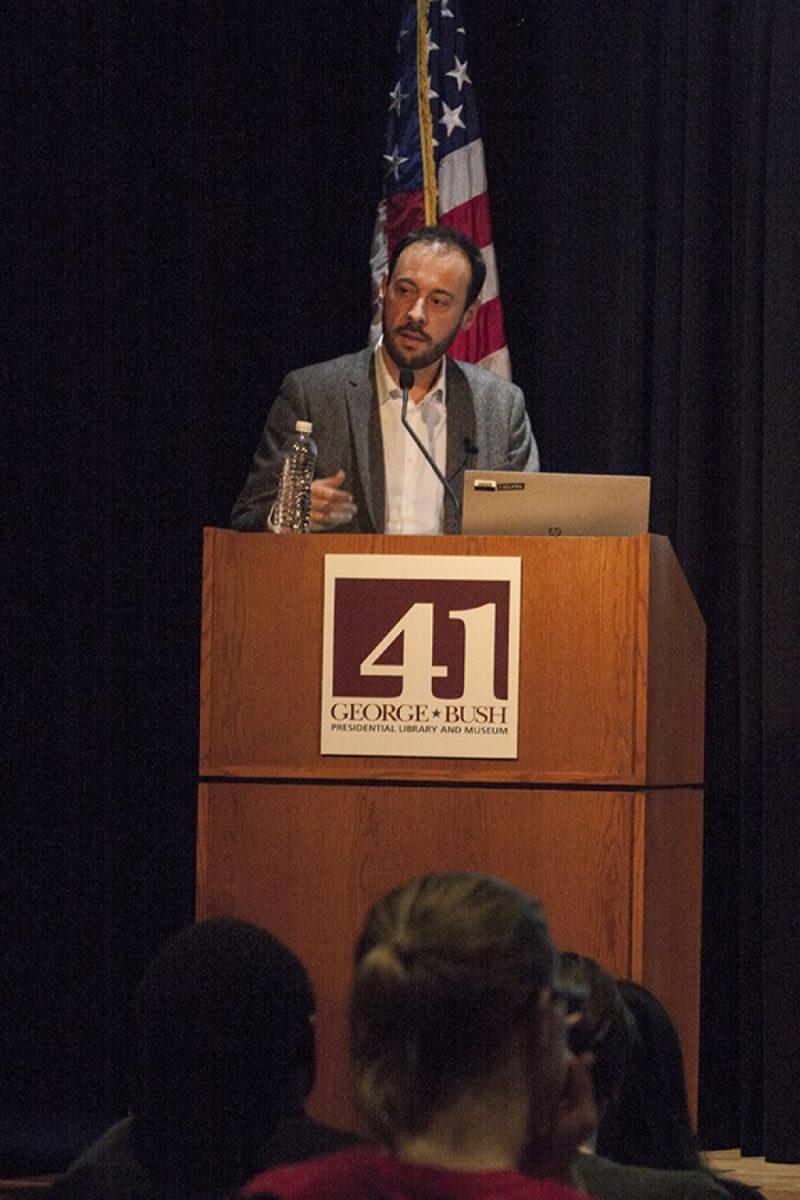Public opinions in France mirror those seen in America in 2001, according to statistics shown by a visiting French professor Wednesday morning.
The lecture kicked off the “European Politics and Democracy Seminar Series” by the Bush School as part of the Texas A&M Grand Challenge “Strengthening Democracy” initiative. The seminar, “The State of the French Democracy,” was given by renowned researcher and french professor Martial Foucault and focused on public opinion regarding the French democracy.
Foucault touched on trends in public opinion after the Jan. 7 attack on the satirical newspaper Charlie Hebdo that killed 11 and injured 11 more, discussing how the attacks have brought together the country — at least in the short term.
Foucault said he has noticed political and national unity between almost all political parties in France since the terrorist attacks, including a Jan. 11 national march.
“There was this huge march, a demonstration, on [Jan. 11], with a lot of people, four million French people in the street, a lot of political leaders, international political leaders and so during this timeline from Jan. 11 to today it seemed that the first reaction or the first interpretation of political unity was to make the demonstration that democracy could be a strong barrier to any internal or external threats,” Foucault said.
Immediate unity and reaction doesn’t always lead to any long-term changes, Foucault said.
“I’m not necessarily convinced that such national unity is directly connected to a new world or a new democracy for France,” Foucault said. “I mean that national unity is probably easy to be implemented in hard political times … and socio-economic hard times.”
Guy Whitten, director of the European Union Center and political science professor, said he found Foucault’s presentation insightful and thought the data on public opinion in the French democracy reflected events in America’s recent past, namely in the aftermath of 9/11.
“What he was showing and what he is starting to see in some of the data they’ve taken since the Charlie Hebdo events is that things have temporarily gotten better, but this is what always happens,” Whitten said. “I mean this is what always happens, we saw this after 9/11, Bush’s popularity soared to a sort of all-time record and then sort of steadily went down.”
Whitten said although this spike in unified public sentiment is a common short-term trend, it is not something that tends to last. Whitten said the long-term data typically shows public opinion turn fairly pessimistic.
Whitten said these trends happen across the histories of all longer-standing Western democracies.
“I think we see this across a lot of major democracies — the older, more mature democracies — people don’t like the national politicians, they don’t like the national political parties, but they still think with all its flaws that democracy is the way to go,” Whitten said.
Claire Stieg, political science graduate student, said she found the lecture very timely and applicable with current events.
“I think in light of the recent events and what’s happening in France it’s very relevant, and he broke it down so it was easy for someone who’s not necessarily an academic to see what’s going on in France right now and see how the population is reacting to current events,” Stieg said.
The event was sponsored by the European Union Center, Department of Political Science, College of Liberal Arts; The Scowcroft Institute of International Affairs, Bush School of Government and Public Service; and The George Bush Presidential Library and Museum, Texas A&M University.
Public opinion researcher talks French unity after tragedy
January 28, 2015
Allison Bradshaw — THE BATTALION
Martial Foucault, a researcher from France, spoke Wednesday about public opinion following the Charlie Hebdo attacks.
Donate to The Battalion
Your donation will support the student journalists of Texas A&M University - College Station. Your contribution will allow us to purchase equipment and cover our annual website hosting costs.




















